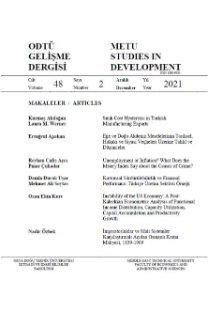Zorunlu göçün yol açtığı refah kaybının incelenmesi: Yaşam memnuniyeti yaklaşımı
Bu çalışma, kişilerin zorunlu göçmen konumu ile refahları arasındaki ilişkiyi araştırdı. İlgili literatürdeki çalışmalardan farklı olarak, kişilerin refah ölçütü olarak beyan ettikleri yaşam memnuniyeti ele alındı. 2013 yılında gerçekleştirilen Yaşam Memnuniyeti Araştırması'nın verisi kullanılarak, zorunlu göçmen olmanın yaşam memnuniyetine etkisi tahmin edildi. Tahmin sonuçları, kişilerin zorunlu göçmen konumu ile yaşam memnuniyeti düzeyleri arasında negatif bir bağ olduğunu işaret etmektedir. Bu negatif bağıntının kişilerin cinsiyet, yaş ve eğitim düzeyi gibi özelliklerine göre ne ölçüde değiştiği incelendi. Üniversite mezunları dışındaki tüm alt gruplarda zorunlu göçmenliğin negatif etkisi olduğu saptandı. Ayrıca bu negatif etkinin, erkekler, 55 ve üstü yaş grubundakiler ve lise veya lise altı eğitim düzeyine sahip olanlar arasında daha şiddetli olduğunu işaret eden bulgulara ulaşıldı. Son olarak, zorunlu göçmenlerin sağlık durumlarından, hanehalkı gelirlerinden ve çalıştıkları işlerden daha düşük düzeyde memnun oldukları bulundu
An exploratory analysis of the welfare change caused by forced migration: A life satisfaction approach
This study is the first to explore a statistical association between being a forced migrant and life satisfaction considering the multidimensional changes induced by forced migration in Turkey. Using data from the Life Satisfaction Survey conducted in 2013, I utilized ordered probit and ordinary least squares methods to determine the extent to which individuals' life satisfaction is related to their forced migrant status. The regression analysis provides evidence that there exists a negative association between being a forced migrant and life satisfaction. I also investigated how the estimated coefficient on forced migrant status varies with individual characteristics, such as gender, age, and education. Except for university graduates, forced migration's negative effect appears to hold for all groups. In fact, estimation results suggest that the adverse consequences of forced migration seem to be felt more heavily by men, individuals whose highest level of education is high school or less than high school, and individuals aged 55 years and older. Finally, the incidence of forced migration also seems to reduce individuals' satisfaction in other domains of well-being, such as health satisfaction, household income satisfaction, and job satisfaction.
___
- AKAY, A., CONSTANT, A. ve CORRADO, G. (2014), "The Impact of Immigration on the Well- Being of Natives", Journal of Economic Behaviour & Organization, 103, 72-92.
- BALTATESCU, S. (2007), "Central and Eastern European Migrants' Subjective Quality of Life: A Comparative Study", Journal of Identity and Migration Studies, 1(2), 67-81.
- BAUER, K. T., BRAUN, S. ve KVASNICKA, M. (2013), "The Economic Integration of Forced Migrant: Evidence for Post-War Germany", The Economic Journal, 123 (571), 998-1024.
- BEŞİKÇİ, İ. (2013), Kürtlerin Mecburi İskanı, İsmail Beşikçi Vakfı Yayınları.
- BETTS, A. (2009), Forced Migration and Global Politics, Wiley Blackwell, Oxford, UK. BİANET (2013), "Linç Bugün de Devam Etti, Romanlar Evleri Terk Etti", http://www.bianet.org/bianet/toplum/149776-linc-bugun-de-devam-etti-romanlar-evleri-terk etti.html, 12.02.2015.
- BİRLEŞMİŞ MİLLETLER MÜLTECİLER YÜKSEK KOMİSERLİĞİ (BMMYK-UNHCR), (2014) Global Trends 2013, BMMYK-UNHCR, Genava.
- BORRAZ, F., POZO, S. ve ROSSI, M. (2010), "And What About the Family Back Home? Internataional Migration and Happiness in Cuenca, Ecuador", Journal of Business Strategies, 27 (1), 7-27.
- DOLAN, P. ve FUJIWARA, D. (2012), "Valuing Adult Learning: Comparing Wellbeing Valuation to Contingent Valuation", BIS Research Paper Number 85, Department for Business, Innovation and Skills, London.
- DÜNDAR, F. (2011), İttihat ve Terakki'nin Müslümanları İskan Politikası, İletişim Yayınları, İstanbul.
- --------(2013), Modern Türkiye'nin Şifresi: İttihat ve Terakki'nin Etnisite Mühendisliği, İletişim Yayınları, İstanbul.
- FALCK, O., HEBLICH, S., ve LINK, S. (2011), "The Evils of Forced Migration: Do Integration Policies Alleviate Migrants' Economic Situations", Discussion Paper, No: 5829, IZA Bonn.
- FUJIWARA, D. ve CAMPBELL, R. (2011), "Valuation Techniques for Social Cost-Benefit Analyis: Stated Preference, Revealed Preference and Subjective Wellbeing Aproaches", Discsussion Paper, U.K. Department for Work and Pensions, London.
- HACETTEPE ÜNİVERSİTESİ NÜFUS ETÜTLERİ ENSTİTÜSÜ (2006), Türkiye Göç ve Yerinden Olmuş Nüfus Araştırması, Hacettepe Üniversitesi Nüfus Etütleri Enstitüsü, Ankara.
- --------(2015), 2013 Türkiye ve Sağlık Araştırması İleri Analiz Çalışması, Hacettepe Üniversitesi Nüfus Etütleri Enstitüsü, Ankara.
- HERBST, C. (2011), "'Paradoxical' Decline? Another Look at the Relative Reduction in Female Happiness", Journal of Economic Psychology, 32 (59), 773-788.
- IBANEZ, M. A., ve VELEZ, E. C. (2008), "Civil Conflict and Forced Migration: The Micro Determinants and Welfare Losses of Displacement in Columbia", World Development, 36 (4), 659-676.
- IBANEZ, M. A. ve MOYA, A. (2010), "Vulnerability of Victims of Civil Conflicts: Empirical Evidence for the Displaced Population in Columbia", World Development, 38, (4), 647-663.
- İŞERİ, G. (2014), Ateşin ve Sürgünün Gölgesinde Kentsel Dönüşüm, NotaBene Yayınları, Ankara.
- KONDYLIS, F. (2008), "Agricultural Outputs and Conflict Displacement: Evidence from a Policy Intervention in Rwanda", Economic Development and Cultural Change, 57 (1), 31-66.
- --------(2010), "Conflict Displacement and Labor Market Outcomes in Post-War Bosnia and Herzegovina", Journal of Development Economics, 93 (2) 235-248.
- RUIZ, I. ve VARGAS-SILVIA, C. (2013), "The Economics of Forced Migration. The Journal of Development Studies", 49 (6), 772-784.
- SAFI, M. (2010), "Immigrants' Life Satisfaction in Europe: Between Assimilation and Discrimination", European Sociological Review, 26 (2), 159-176.
- SARVIMAKI, M., UUSITALO, R. ve JANTTI, M. (2009), "Long-Term Effects of Forced Migration", Discussion Paper, No. 4003, IZA Bonn.
- SIMPSON, N. B. (2013). "Happiness and Migration", Constant, Ameli F. - Zimmerman, Klaus F. (Ed.), International Handbook on the Economics of Migration, Edward Elgar Publishing Inc., Massachusets, s. 393-407.
- SOSYALİZM ve TOPLUMSAL MÜCADELELER ANSİKLOPEDİSİ (1988). 1960-1980, 7. Cilt,
- ISSN: 1010-9935
- Yayın Aralığı: Yılda 3 Sayı
- Başlangıç: 2018
- Yayıncı: ODTÜ İİBF
Sayıdaki Diğer Makaleler
Examining hate speech from the perspective of Arendt's political theory
Examining hate speech from the perspective of Arendt's political theory
Kurumsal değişim, güç mekanizmaları ve direniş taktikleri: Türk sağlık alanında bir araştırma
MUSTAFA ÖZSEVEN, Ali DANIŞMAN, Ali SÜHA BİNGÖL
Zorunlu göçün yol açtığı refah kaybının incelenmesi: Yaşam memnuniyeti yaklaşımı
Patronaj ilişkilerinde Latin Amerika örneği: Kır-kent ayrımına bir bakış
